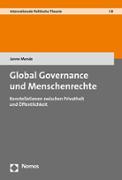The rise of private actors, their relevance, power and legitimacy in global governance challenges the human rights regime and the relations between public and private spheres alike.
The study uses the United Nations human rights regime in order to discuss the role of business actors in global governance from an International Political Theory perspective. It develops an interdependent triad between a) responsibility for human rights, b) legitimacy, and c) power. On this basis, first, the study develops the role of business as societal actors that can neither be defined as merely private nor public, thereby transcending the classic two-pole constellation between public and private. Second, the study introduces the concept of complementary responsibility and discusses how it can strengthen the human rights regime, preventing its transformation into a privatized regime.
The Open-ended intergovernmental working group on transnational corporations and other business enterprises with respect to human rights (OEIWG) in the United Nations Human Rights Council aims at the development of a legally binding human rights treaty for business companies. Thus, it provides a state-of-the-art case for an empirical contribution to the conceptual discussion. First, it challenges the mainly soft law frame of private governance and the private role of business. Second, it transforms the classic dichotomy between public and private in international law. Third, it contributes to the expansion of power and legitimacy of business actors in global governance – its controversial status and its open outcome notwithstanding.
With an explanatory qualitative content analysis of the discussions in the OEIWG, the project will provide insights into a highly politicized and relevant process in the United Nations. The study aims to provide conceptual as well as normative criteria for determining the changing scope, content and interdependence of power, legitimacy and human rights responsibility of business actors, their societal role in global governance and their impact on the human rights regime.
Part of the project was the workshop: “Human Rights Responsibilities beyond the State. Pushing the Boundaries of Public and Private“, Max Planck Institute for Comparative Public Law and International Law, 10.-11.06.2021
The project and workshop results were published in single publications (see list below) as well as in 2 special issues:
Mende, Janne (2023): Corporate Responsibility for Human Rights beyond the Public-Private Divide, in: The Nordic Journal of Human Rights 41(3)
Mende, Janne/Hoff, Anneloes (2022): The Governance Authority of Non-State Actors in the Business and Human Rights Regime, in: The Journal of Human Rights 21(5)
The project has been funded by the Deutsche Forschungsgemeinschaft (DFG, German Research Foundation), project number 398306144, 2018-2021.
PD Dr. Janne Mende headed the project 2018-2021, first at Institute for Political Sciences at the University of Giessen, and from 2020 on at the Max Planck Institute for Comparative Public Law and International Law, where she holds a position as Max Planck Research Group Leader. Prior to that, she has held a position as deputy professor for Transnational Governance at the Technical University of Darmstadt, among others. Her research interests include human rights, global governance, international institutions and transnational norms. Her publications include “Global Governance und Menschenrechte: Konstellationen zwischen Privatheit und Öffentlichkeit“ (Nomos 2020), “A Human Right to Culture and Identity? The Ambivalence of Group Rights“ (Rowman & Littlefield International 2016) and “Begründungsmuster weiblicher Genitalverstümmelung. Zur Vermittlung von Kulturrelativismus und Universalismus“ (Transcript 2011).
Anneloes Hoff was a Senior Research Fellow in the project since 2020, working on business and human rights. Her interdisciplinary background includes a DPhil and an MPhil in Socio-Legal Studies from the University of Oxford, and a BA (Hons) in International Law and Politics from University College Roosevelt (Utrecht University). Her doctoral thesis examined a gold mining corporation’s corporate social responsibility practices in the face of mining resistance, drawing on fifteen months of ethnographic fieldwork in Colombia.
Marcel Frentzel was a student assistant in the project since 2018. He is a Master student of Democracy and Governance at the Justus-Liebig-University Giessen since Fall 2019. He received his bachelor's degree in political science and philosophy from the University Kassel in 2019. His research interests focus on democratic theory, international political theory and philosophy of science.
